Sterling slips from multi-week high, volatility rises before Brexit vote

LONDON: Sterling fell from a two-month high versus the dollar on Tuesday and volatility levels spiked as markets braced for parliament to give the thumbs-down to British Prime Minister Theresa May's Brexit deal later in the day.
In a voting session due to start at 1900 GMT lawmakers will vote on May's plan but her recent efforts to win support for the deal look set to fail, despite her warnings that rejection of the deal could lead to Britain staying in the European Union. .
Sterling is seen as having already priced in a 'No' from parliament, with investors focusing instead on the margin May loses the vote by.
"It's a done deal that the vote will be defeated. Initial market focus will be on the scale of the defeat and the expectation is it will be heavy -- 100-200 votes," MUFG strategist Lee Hardman said.
"The surprise will be if the defeat is narrower. The balance of risks (for sterling) is to the upside as people expect a big margin... But it will still leave us in a state of deadlock."
While a margin of defeat of 40-50 votes raises expectations of the deal passing with some amendments, most reckon a heavy defeat could either delay Britain's March 29 departure date or bring about a second referendum which could end up cancelling Brexit.
That's especially so as markets now expect parliament to block a no-deal or "hard" Brexit -- the worst case scenario -- so the currency has firmed in recent weeks, also benefiting from dollar and euro weakness.
http://tmsnrt.rs/2hwV9Hv
By 1300 GMT, the pound had slipped 0.3 percent on the day at $1.2837, having retreated from two-month highs hit on Monday at $1.2930. Against the euro, it was flat at 88.010 pence as the single currency slipped after the release of German growth data .
British domestically focused stocks edged off one-month highs touched last week while yields on 10-year government bonds slipped 2.2 basis points.
VOLATILITY SPIKE, SHORT POSITIONS
While sterling markets are relatively calm, fear of post-vote chaos is again driving up sterling implied volatility -- options markets' gauge of expected swings in an exchange rate. Overnight volatility jumped to 23.5 percent from late-Monday levels around 8 percent.
One-month implied volatility has also crept higher to one-week highs around 12.65 percent after slipping in recent days as risks of a no-deal Brexit appeared to recede.
"Sterling's overnight implied volatility is pricing around a 1 percent move today," Commonwealth Bank of Australia analysts told clients.
However, one percent intra-day moves in sterling have become relatively frequent since the June 2016 referendum. Aside from the initial collapse in the days immediately after the vote, sterling/dollar has moved 1 percent or more on 52 days, on a close-to-close basis.
That's 24 up days and 28 down days.
Meanwhile sterling risk reversals -- a gauge of investor expectations for a currency's direction -- have risen steadily in recent weeks, indicating increased demand for call options, derivatives that give investors the right to buy an asset.
But while one-month risk reversals for instance recently hit seven-month highs, implying a less bearish sterling stance , they edged lower on Tuesday.
Analysts warned of surprise vote outcomes and also the risk of a general election if an opposition no-confidence motion succeeds.
"I don't think tonight will provide the move higher that folks are looking for," Nomura FX strategist Jordan Rochester said.
"Until that confidence vote is out the way and (May) makes it clear what she intends to do, we are still operating with downside risks attached to sterling, that could quickly become a market focus once again."
























Comments
Comments are closed.